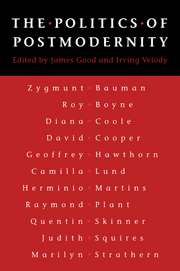Part I - Modernity and its vicissitudes
Published online by Cambridge University Press: 05 June 2012
Summary
Precisely why an age of anxiety has been created by the term ‘post-modernity’ and why in spite of vociferous opposition from quarters both Left and Right it has nevertheless made its presence increasingly felt can be seen in the chapters in this section.
Perhaps most prominent among those presenting critiques of modernity and its associated theoretical apparatus in the human sciences has been Zygmunt Bauman: in many ways a product of one of the strongest modernist visions, Marxism and the communist movement. Bauman as a member of an ethnic minority has been exceptionally well placed to both read and offer his own commentaries on this world.
Bauman's chapter explores aspects of the changing relationships between modernity and postmodernity. For Bauman, social modernity is about standards, hope and guilt; psychically, modernity is about identity, about the truth of being as not-yet-here. Both socially and psychically modernity is incurably self-critical: an endless exercise in self-cancelling and self-invalidating. Bauman develops his themes of parvenu and pariah by noting that in such a world all residents are nomads, but nomads who wander in order to settle. Wherever they come and dearly wish to stay, these nomads find themselves to be parvenus: someone already in but not quite of the place. Parvenus are people in frantic search for identities, chasing identities because from the start they had been denied definitions. For the parvenu the game is unwinnable, at least as long as it goes on being played by the set rules. Only the explosion of the myth of belonging can bring out the truth of the incompleteness of nomadic existence.
- Type
- Chapter
- Information
- The Politics of Postmodernity , pp. 19 - 22Publisher: Cambridge University PressPrint publication year: 1998



